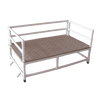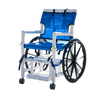Understanding and Preventing Heat Stroke: Essential Tips for Seniors

Heat stroke is a serious and potentially life-threatening condition, especially for seniors. It occurs when the body overheats and cannot cool down effectively. This blog post will provide essential information and tips to help seniors prevent heat stroke and stay safe during hot weather.
Recognizing Heat Stroke Symptoms
Heat stroke symptoms include a high body temperature (above 103°F), rapid pulse, headache, dizziness, nausea, confusion, and loss of consciousness. Immediate medical attention is crucial if these symptoms appear (Mayo Clinic, 2021).
Stay Hydrated
Drinking plenty of water throughout the day is essential for preventing dehydration and heat stroke. Seniors should avoid alcohol and caffeine, which can contribute to dehydration (Centers for Disease Control and Prevention, 2021). Carry a water bottle when going out, and set reminders to drink water regularly.

Dress Appropriately
Wearing lightweight, loose-fitting, and light-colored clothing can help keep the body cool. Additionally, using a wide-brimmed hat and sunglasses can protect against direct sun exposure (National Institute on Aging, 2021). Opt for moisture-wicking fabrics that help keep sweat off the skin.
Avoid Peak Sun Hours
Seniors should try to stay indoors during the hottest parts of the day, typically between 10 a.m. and 4 p.m. If outdoor activities are necessary, taking frequent breaks in the shade or a cool place is important (American Heart Association, 2021). Plan errands or walks early in the morning or later in the evening.
Use Fans and Air Conditioning
Keeping the living environment cool with fans, air conditioning, or even visiting air-conditioned public places can help prevent heat stroke. Seniors without air conditioning at home should consider spending time in places like malls or community centers during extreme heat (Harvard Health Publishing, 2021). Portable fans and cooling towels can also provide temporary relief.
Additional Tips:
- Cool Showers: Taking cool showers or baths can help lower body temperature.
- Light Meals: Eating smaller, lighter meals can reduce the metabolic heat produced by the body.
- Buddy System: Have a friend or family member check in regularly during heatwaves to ensure safety.
- Stay Informed: Pay attention to local weather forecasts and heat advisories. Knowing when a heatwave is expected can help seniors prepare in advance (National Weather Service, 2021).
Conclusion
By recognizing the symptoms of heat stroke and taking preventive measures such as staying hydrated, dressing appropriately, avoiding peak sun hours, and using cooling methods, seniors can protect themselves from the dangers of heat stroke. For more personalized advice, consulting with healthcare professionals and referring to reputable sources like the Mayo Clinic and CDC is recommended.
Visit Dansons Medical for a range of high-quality and reliable medical equipment and resources to support senior health. Let us be your partners in promoting a healthier and more comfortable lifestyle for seniors.
- Dansons Medical Support


 Lifts
Lifts
 Patient Lifts
Patient Lifts
 Stand Assists
Stand Assists
 Standing Aids
Standing Aids
 Slings
Slings
 Parts & Accessories
Parts & Accessories
 Wheelchairs
Wheelchairs
 Ergonomic
Ergonomic
 Portable
Portable
 Reclining
Reclining
 Standing
Standing
 Sporting
Sporting
 Bariatric
Bariatric
 Ramps
Ramps
 Modular
Modular
 Portable
Portable
 Parts & Accessories
Parts & Accessories
 Walking Aids
Walking Aids
 Rollator Walkers
Rollator Walkers
 Canes
Canes
 Crutches
Crutches
 Parts & Accessories
Parts & Accessories
 Scooters
Scooters
 4-Wheel
4-Wheel
 Folding
Folding
 Parts & Accessories
Parts & Accessories
 Nursing
Nursing
 Pregnancy Comfort
Pregnancy Comfort
 Self-Care
Self-Care
 Pump Parts
Pump Parts
 Exercise Equipment
Exercise Equipment
 Treadmills
Treadmills
 Walking Pads
Walking Pads
 Rowing Machines
Rowing Machines
 Strength & Conditioning
Strength & Conditioning
 Saunas
Saunas
 Stethoscopes
Stethoscopes
 Surgical Instruments
Surgical Instruments
 Forceps
Forceps
 Scalpels
Scalpels
 IV Poles
IV Poles
 Oxygen
Oxygen
 Beds
Beds
 Electric Beds
Electric Beds
 Standing Beds
Standing Beds
 Mattresses
Mattresses
 Bed Accessories
Bed Accessories
 Bed Parts
Bed Parts
 Chairs
Chairs
 Medical Recliners
Medical Recliners
 Phlebotomy Chairs
Phlebotomy Chairs
 Stools & Task Chairs
Stools & Task Chairs
 Parts & Accessories
Parts & Accessories
 Tables
Tables
 Overbed Tables
Overbed Tables
 Medical Tables
Medical Tables
 Recovery Couches
Recovery Couches
 Cabinets
Cabinets
 Pool
Pool
 Pool Lifts
Pool Lifts
 Pool Fitness and Therapy
Pool Fitness and Therapy
 Pool Access Chairs
Pool Access Chairs
 Slings
Slings
 Parts & Accessories
Parts & Accessories
 Bath
Bath
 Toileting Aids
Toileting Aids
 Bath Lifts
Bath Lifts
 Shower Seats
Shower Seats
 Parts & Accessories
Parts & Accessories
 Portable Shower
Portable Shower
 Dansons Products
Dansons Products
 Transfer Aids
Transfer Aids
 Cushions
Cushions
 eBooks
eBooks
 Helpful Articles
Helpful Articles
 Reviews
Reviews
 Contact Us
Contact Us
 Create Account
Create Account
 Request a Quote
Request a Quote

Comments 0